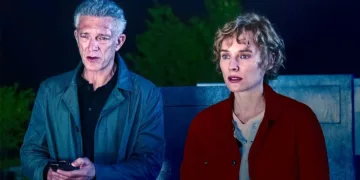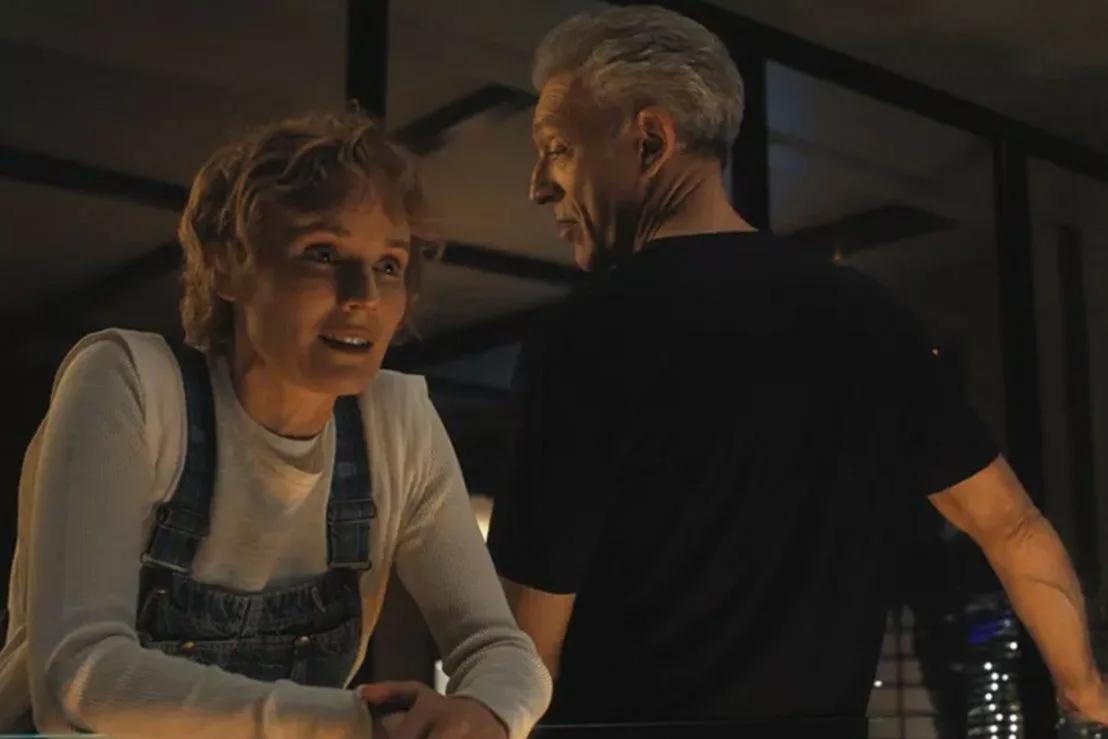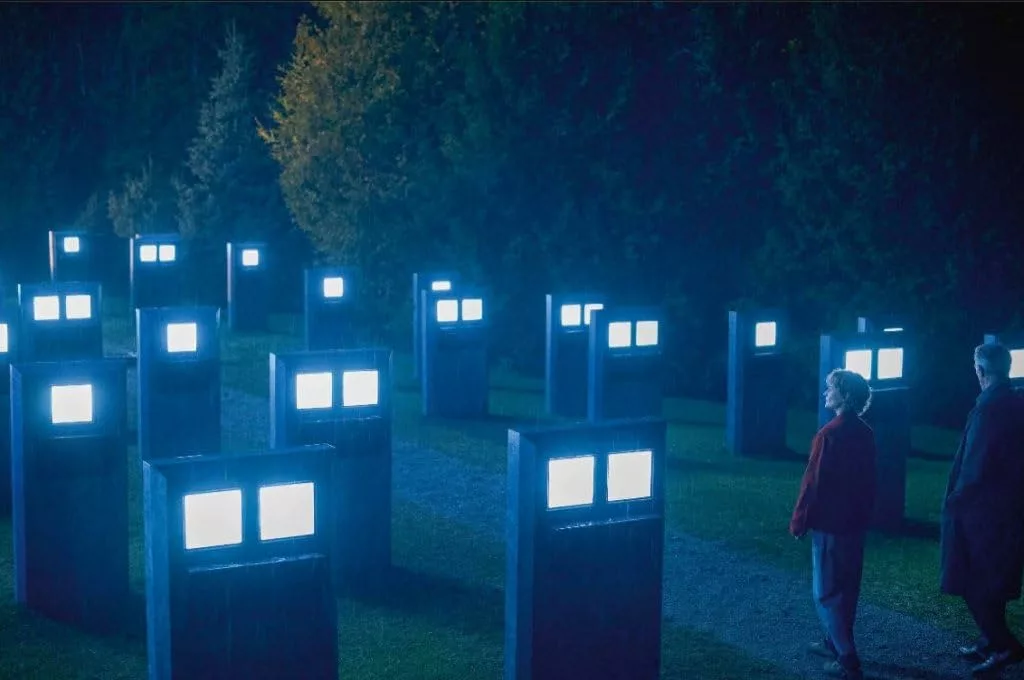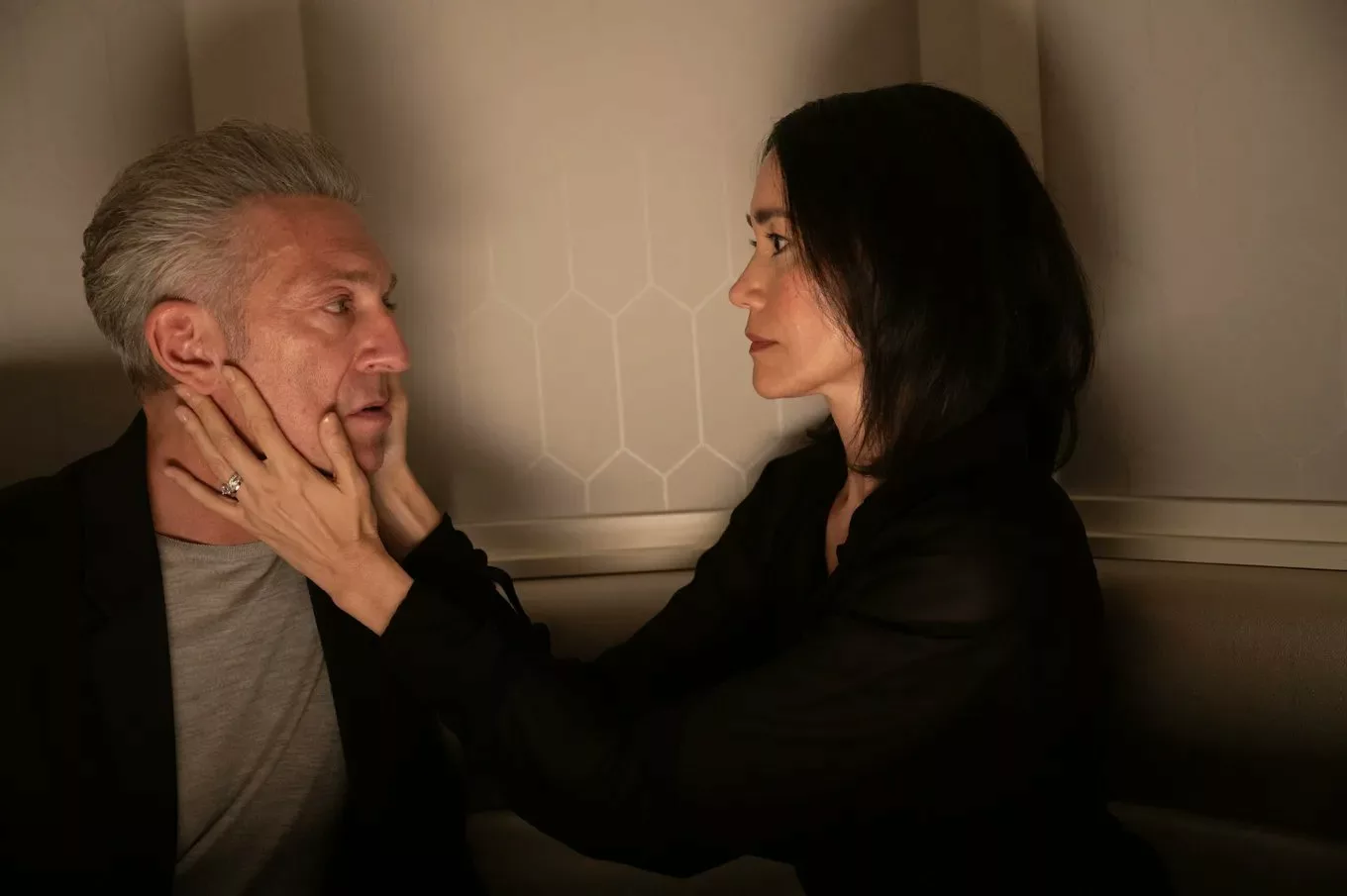David Cronenberg has long been one of cinema’s foremost pioneers of body horror. Across films like The Fly, Rabid, and Crash, Cronenberg confronts viewers with unsettling meditations on biology, psychology, and human transformation. He imagines science morphing flesh in disturbing yet fascinating ways, placing emotion and identity within physical forms in decay or revolt.
Cronenberg’s latest, The Shrouds, sees the director returning to his signature brand of visceral unease. But where past films centered squarely on mutated bodies, this one fixates on bodies that have left this world. The film’s protagonist is Karsh, a widower still grieving four years after his wife’s death. To process his loss, Karsh invents a novel burial technology: electronically woven “shrouds” that allow the living to monitor their departed loved ones’ remains decomposing in real time.
Installed in a hi-tech cemetery adjoining Karsh’s sleek restaurant, the shrouds give mourners a disturbing kind of closure. But they also threaten to keep Karsh firmly anchored in the past, unable to accept his wife’s physical passing.
As the film unfolds, Karsh is drawn into a shadowy world of conspiracy, raising complex questions about the blurry lines between remembrance and obsession, reality and simulation. With The Shrouds, Cronenberg once again leads viewers to disquieting places, exploring how technology can reconfigure our relationship with life, death, and what lies beyond the grave.
The Veil Between Life and Death
Toronto businessman Karsh is still deeply grieving the loss of his wife Rebecca, four years after her death from an aggressive form of cancer. In an attempt to process his emotions, Karsh invents a novel burial technology: “GraveTech” shrouds lined with sensors and tiny cameras. These woven fabrics allow mourners to monitor their loved ones’ remains decomposing in real time through an app.
Karsh installs one of these shrouds on Rebecca’s coffin and buries her in the hi-tech cemetery adjoining his sleek restaurant. Here, he frequently checks in on Rebecca’s decay, struggling to accept her physical passing. But his attempts to preserve her memory threaten to hold him back from truly moving on.
Problems arise when over a dozen graves, including Rebecca’s, are vandalized one night. Disturbed bones and damaged monitoring systems only deepen Karsh’s despair. He brings in Guy Pearce’s character, Maury, his former brother-in-law and tech expert, to help investigate. But as conspiracy theories spread, it’s unclear who or what is really behind the attacks.
Karsh distracts himself by pursuing relationships with both Pearce’s ex-wife, Terry, Rebecca’s twin sister, and a mysterious blind woman named Soo-Min. These dynamics grow increasingly complex as the plot convolutes. Karsh finds himself entangled in a web involving international business deals, digital avatars, and accusations of madness.
By the end, the film offers more questions than answers. Karsh remains haunted by his inability to let go of Rebecca. But perhaps closure can only come from accepting death as the natural order and finding a way to move forward in life without clinging to past illusions. Cronenberg examines these profound issues with his signature unease, though the film’s convoluted nature leaves the essence of its metaphors frustratingly obscure.
Themes of Mortality and Memory
There’s no question that David Cronenberg’s latest film, The Shrouds, deals with deeply personal themes of grief, loss, and the human inability to let go of loved ones even in death. Cronenberg himself penned the screenplay just two years after the passing of his own wife, and its exploration of these complex emotions feels rooted in raw, authentic places of the human experience.
We learn that the film’s main character, Karsh, played convincingly by Vincent Cassel, lost his wife Becca four years prior to cancer. Yet his mourning process remains frozen in time—hhe remains haunted by her memory and seems unable to truly move forward in his life. Karsh channels his fixation into developing new technologies meant to prolong connections with the dead. Through his company GraveTech, he creates networked “shrouds” that literally map a buried body down to the cellular level, enabling the living to watch the decomposition of their departed in lurid detail from an app or online monitors.
On one level, Karsh’s invention speaks to the human desire to grasp for any sense of lingering presence after the absolute finality of death. By following Becca’s physical decay in real-time, it helps him deny the reality of her passing in a tangible, if disturbing, way. But Cronenberg also seems to suggest that such methods do more harm than good, stunting true grieving and replacing acceptance with an endless cycle of re-traumatization.
As the film explores the ripple effects of Karsh’s technology, it raises profound questions about memory, mortality, and whether the dead belong to the realm of flesh or spirit. If relationships can officially “end” only when all signs of the body have faded, what does that mean for our own identities or humanity?
By treading into such ominous philosophical terrain, The Shrouds takes Cronenberg’s longstanding interests in body horror to thought-provoking new places about the modern intersections of tech, science, and the ever-elusive human heart. While the film may not offer easy answers, its willingness to probe such unsettling issues leaves a lingering impact.
Rediscovering Grief
David Cronenberg has long been renowned for his unflinching examinations of the physical body and the horrors that can afflict the flesh. With The Shrouds, he approaches this subject once more, but through a new lens—that of profound personal loss. Cronenberg imbues the film with a sense of quiet grief, contrasting it with livelier works where visceral thrills come to the fore.
While past films shocked audiences with outrageous mutations and graphic medical procedures, The Shrouds takes a more subdued approach. Douglas Koch’s cinematography lends an ethereal, sterile palette, filtering the world through a shroud of sorrow. Monochromatic colors drain scenes of vitality, mirroring the emotional numbness of the protagonist, Karsh. Body horror elements surface subtly, like the evolving remains under Becca’s shroud, viewed with clinical removal versus explosive bombast.
Cronenberg’s stationary camerawork creates distance, enhancing the dissociative feeling of separating from mortality. Memorable sequences play out with minimal coverage, highlighting dialogue over dramatic visuals. Flashbacks to Becca’s cancer treatment lack sensationalism, focusing on her interior torment. This intimate sight reveals more about human fragility than any flayed epidermis ever could.
With The Shrouds, Cronenberg transforms the language of body horror into something quieter yet no less profound. Peeling back sensationalism exposes the raw nerves of lived trauma normally kept private. His typical preoccupation with physical breakdown illuminates an even deeper theme—our inability to escape psychic dissolution following those we lose. Through unique direction and style, Cronenberg discovers new depths in a subject previously explored, just as grief transforms with time.
Cronenberg’s Mirror: Vincent Cassel Embodies the Director’s Vision
With his angular features and shock of gray hair, Vincent Cassel is a dead ringer for David Cronenberg. More than just physical resemblance, Cassel inhabits the role of Karsh with an intense interiority that makes him a convincing conduit for the director’s psyche. His gaunt visage speaks volumes in this meditative film, where dialogue is scarce and ideas are pondered in silence.
Karsh’s unwillingness to release his grip on the past comes through in every haunted glance. Cassel imbues the character with palpable grief, obsession, and fraying mental stability. Even in more lighthearted moments, such as his dryly amusing blind date, an undercurrent of instability ripples beneath the surface. Cassel ensures viewers are never quite comfortable with Karsh and his macabre innovations, dragging us into his shadowy psyche.
In a riskier dual role, Diane Kruger likewise throws herself fully into the film’s themes of dissolution. She is as agonizing yet compelling as Becca, rawly depicting the ravages of illness and her haunting post-death appearances. Kruger also transforms wholly into Becca’s prickly sister, Terry. Where Becca embodies ephemeral beauty, Terry is earthy and grounded—yet another reflection of our fleeting grip on corporeal existence. Kruger is unafraid to bare skin and soul, fearlessly exploring the film’s knotty ideas about womanhood, death, and synthetic reproduction through Hunny.
While Cassel and Kruger absorb viewers into the film’s dense metaphysical atmosphere, other actors have less to work with. Guy Pearce is effectively annoying as the twitchy ex, but his character remains little more than a plot device. Sandrine Holt brings beauty but lacks dimension as a wealthy widow. Their underwritten roles pale in relation to the depths plumbed by Cassel and Kruger, who transcend their characters to symbolize Cronenberg’s boundless ruminations on technology, mortality, and the elusiveness of truth.
Cronenberg’s Vision of Mortality
David Cronenberg has long probed humanity’s fraught relationship with the flesh through his uncanny body horror films. With The Shrouds, the aging auteur once again contemplates our mortality, this time through the lens of recent personal loss.
Vincent Cassel stars as Karsh, a widower attempting to preserve his late wife’s memory via futuristic grave-viewing technology. Though the premise holds promise, Karsh becomes bogged down in addressing convoluted conspiracies, leaving existential themes muffled. Cronenberg’s vision remains, but his prowess for twisting plots has faded.
Still, one senses The shrouds stem from Cronenberg’s own journey with grief. Its ruminations on finding purpose after death feel genuine, if not fully realized. In its portrayal of using technology to deny life’s impermanence, the film leaves an unanswered—and unanswerable—question lingering: can any means fully replace accepting loss?
While its focus feels unfocused at times, The Shrouds deserves praise as a likely cathartic work for its director. For viewers, it may spark reflection on mortality’s difficult questions rather than provide answers. After decades of redefining body horror, Cronenberg continues to pose unsettling queries about what makes us human in his remarkable, difficult later period.
The Review
The Shrouds
While The Shrouds possesses the thoughtful qualities we've come to expect from Cronenberg's deeper works, as a complete cinematic experience, it never quite gels in an entirely satisfying way. The more metaphysical elements exploring grief and humanity's relationship with mortality are praiseworthy, if lightly sketched, but storytelling shortcomings prevent the film from achieving its full unsettling potential.
PROS
- An authentic exploration of grief and loss from a personal angle
- Thought-provoking examinations of technology's role in death and mourning
- Strong central performance from Vincent Cassel, embodying Cronenberg
- Gorgeous visual aesthetics and production values
CONS
- The narrative becomes convoluted and loses focus.
- Pacing can be slow without enough payoff.
- Fails to match the provocation of Cronenberg's best work
- Supporting characters and plotlines are underdeveloped.



















































